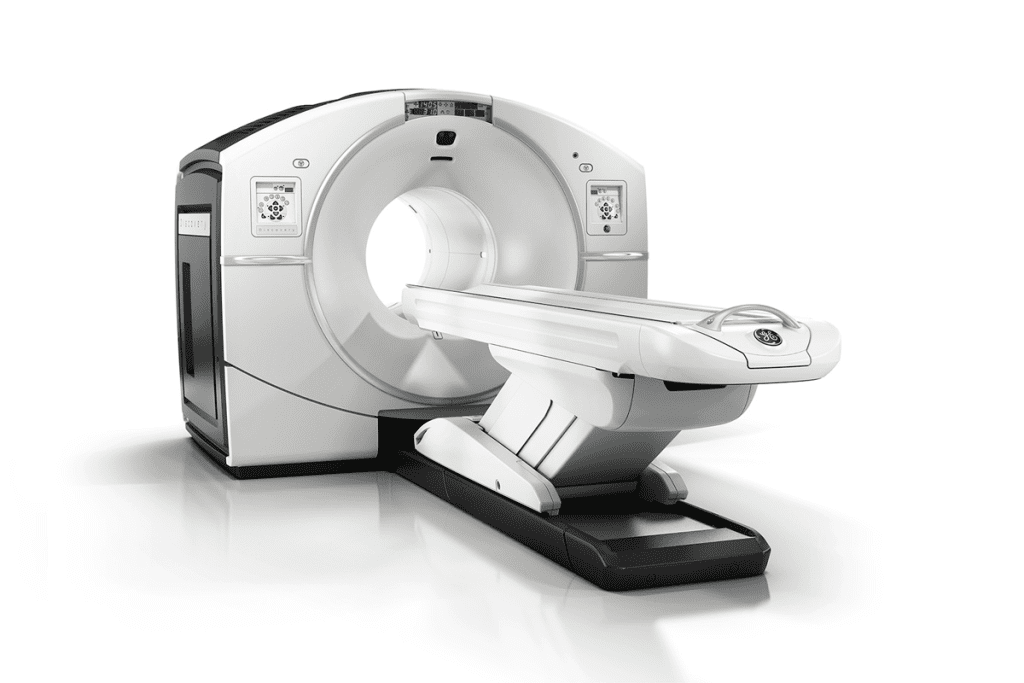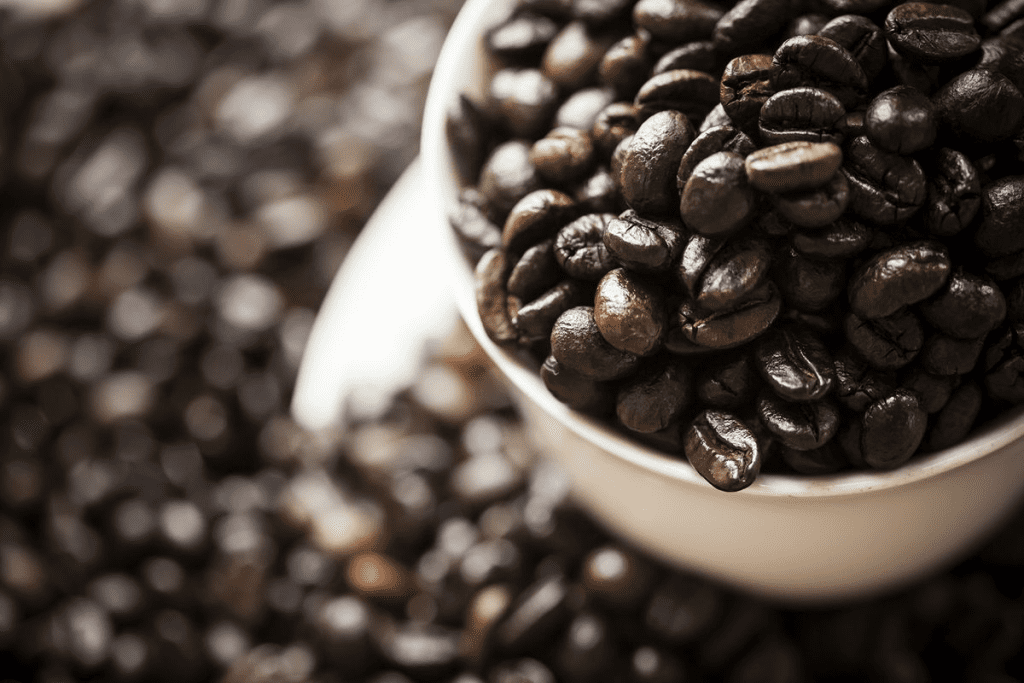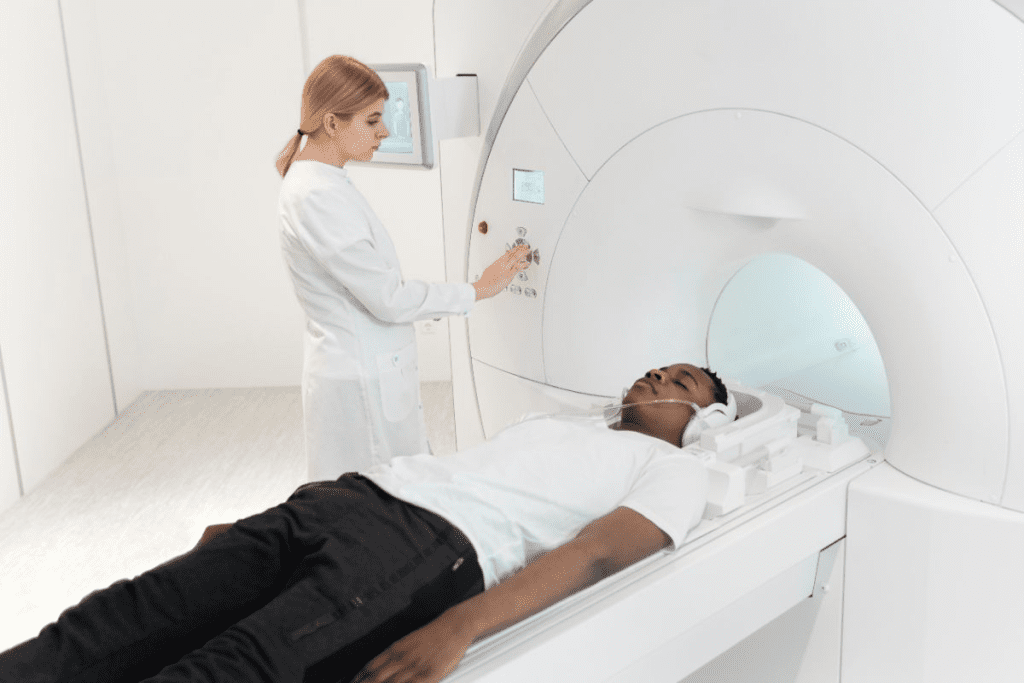Last Updated on November 25, 2025 by

Getting ready for a CT scan means following certain diet rules. Many patients ask, “can you eat before a CT scan?“ The answer depends on the type of scan. For a CT scan with IV contrast, it’s recommended not to eat or drink anything for 4 hours before the procedure. Eating beforehand can interfere with the results.
Caffeine before a CT scan with contrast is also a big no-no because it can affect the scan’s accuracy. A standard CT scan usually takes about 15 minutes, but it can take up to 1 hour and 15 minutes if oral contrast is needed.
At top hospitals like Liv Hospital, following these preparation rules is key to ensuring safety and accurate results. Knowing can you eat before a CT scan and other preparation steps helps patients get the best outcome from their imaging.
Caffeine limits before a CT scan are not random. They are based on how caffeine affects our bodies. Caffeine is a stimulant that can mess with the body’s systems. This can make CT scan results less accurate, even with contrast agents.

Caffeine boosts the heart and blood pressure. This is important for CT scans with contrast agents. Increased heart rate and blood pressure can change how the contrast agent works. This might make the images less clear.
Caffeine can mess with how well contrast agents work in CT scans. Studies show it can change how certain agents, like fluorodeoxyglucose (FDG), are taken up. This altered uptake can make it hard to read the scan results correctly.
For example, caffeine can make the heart take up more FDG. This can hide lesions or mess with how well the heart is working. So, it’s best to avoid caffeine before a CT scan with contrast.
Researchers at St. Louis University School of Medicine have looked into caffeine’s effects on CT scans. They found that caffeine makes the heart rate go up and shows up as high FDG uptake in the heart. This can make it hard to get a good read from the scan.
Knowing how caffeine affects CT scans is key to getting good results. When preparing for a CT scan, it’s important to know how caffeine can change the imaging process.
Caffeine makes your heart beat faster and your blood pressure go up. This can mess with the quality of CT scan images, mainly in heart or blood vessel studies. For those getting a CT scan with contrast, it might not work as well.
Studies show caffeine can cut down cerebral blood flow by 3.4% to 18%. This change can make it harder to see blood flow and brain activity in scans. So, if you have a brain scan and drink caffeine first, the results might not be as clear.

In heart scans, like PET/CT, caffeine can make the heart show up too much. This can hide or look like real problems, making it hard to understand the scan. So, people usually avoid caffeine before heart scans.
Caffeine can make some people feel anxious, leading to increased patient movement during scans. This movement can ruin the quality of the images. It’s important to keep patients calm and comfortable for the best scan results.
By knowing these things, we can prepare better for CT scans. It’s vital to follow what doctors say when a CT with contrast prep is needed.
To get the best results from your CT scan, it’s key to follow certain dietary rules. Knowing what to eat and drink beforehand can greatly affect the scan’s quality. This, in turn, impacts the success of the procedure.
Before your CT scan, there are food and drink rules you need to know. Usually, you’re told to avoid solid foods for a few hours before. The exact time depends on the scan type and your doctor’s advice.
Key dietary restrictions include:
The timing of your last meal before a CT scan is very important. For many, fasting for a few hours is recommended. But this can vary based on the scan type and your health.
It’s essential to follow the specific instructions given by your healthcare provider regarding when to stop eating and drinking before your CT scan.
If your CT scan uses contrast material, staying hydrated is key. Drinking lots of water helps your body process the contrast better. But always follow your healthcare team’s hydration instructions.
If you’re diabetic, managing your diet and meds before a CT scan is critical. You might need to keep taking your insulin and drink extra fruit juice to avoid low blood sugar.
Diabetic patients should:
By sticking to these dietary guidelines, you can help ensure your CT scan gets the best images. This leads to more accurate diagnoses and better treatment plans.
After a CT scan with contrast, it’s key to know about caffeine. The scan is a big deal, but what happens next is just as important. It affects your body’s recovery and the scan’s accuracy.
During a CT scan with contrast, dye is injected into your blood. It helps show important areas. Drinking lots of water after the scan helps get rid of the dye. We tell patients to drink 2-3 extra glasses of water to help.
Caffeine might mix with the dye left in your body. It’s not fully understood, but caffeine can change your heart rate and blood pressure. This could be important when your body is getting rid of the dye.
There’s no exact time to wait before having caffeine again. But waiting a few hours after the scan is a good rule. Always check with your doctor for specific advice.
It’s safe to go back to your usual diet, including caffeine, when your body has processed the dye. Look for these signs:
By following these tips and listening to your body, you can safely go back to your usual diet after a CT scan with contrast.
To get the best results, it’s important to prepare well for your CT scan. Good preparation helps get accurate results.
Start by adjusting your diet 48 to 24 hours before your scan. Avoid foods that could mess with the contrast agent or the scan.
As your scan time gets closer, follow important guidelines. For four hours before, don’t eat solid foods. You can drink water, juice, or decaf coffee or tea.
On the day of your scan, follow this checklist for a smooth process:
After your scan, follow these recovery tips for your safety and comfort. You can go back to your usual diet unless your doctor says not to.
Key recommendations include:
Getting ready for a CT scan is key to getting good results. Knowing how to prepare for a CT scan helps a lot. This way, your test results will be the best they can be.
A CT scan uses X-rays to make detailed pictures of your body. To get the best results, following the preparation for CT and diet advice is important.
By following the CT scan with contrast prep tips in this article, you help make sure your scan results are accurate. This lets doctors give you the best care possible.
Yes, drinking water before a CT scan is usually okay. But always check with your doctor or the imaging center. They might have special rules for staying hydrated before the scan.
For a CT scan with contrast, you might need to avoid eating and drinking for a while. You might also take a contrast agent by mouth or through an IV. Your doctor will tell you exactly what to do.
When drinking oral contrast, do it slowly over 30 minutes to an hour before the scan. This lets the contrast move through your body. The exact timing might depend on the contrast type and the facility’s rules.
Whether you can eat before a CT scan depends on the type of scan and the instructions from your doctor or the imaging center. For some scans, like those of the abdomen, you might need to fast or follow a special diet.
Before a CT scan, you might be told to avoid eating or drinking for a while. You might also be advised to stay hydrated with water or follow a specific diet. Always follow the instructions from your doctor or the imaging center.
Yes, you can usually drink water before a CT scan with contrast. Staying hydrated is good, but check with your doctor or the imaging center for their specific rules.
How long to wait before eating and drinking again after a CT scan with contrast varies. You can usually eat soon after the scan. But, wait a few hours before having caffeine. Your doctor will give you specific advice based on your situation and the scan results.
To prepare for a CT scan, follow the dietary and hydration instructions from your doctor or the imaging center. This might include fasting, avoiding certain foods or drinks, staying hydrated, and possibly taking a contrast agent as directed.
Subscribe to our e-newsletter to stay informed about the latest innovations in the world of health and exclusive offers!